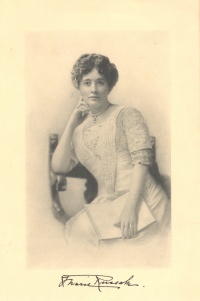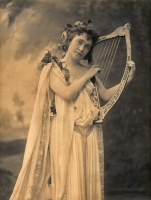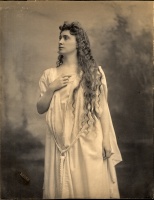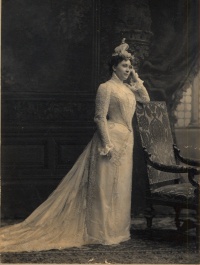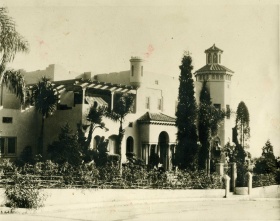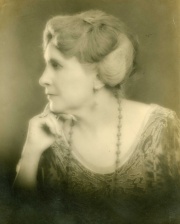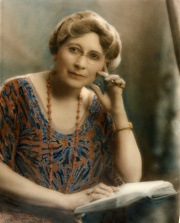Marie Russak Hotchener
Marie Russak Hotchener (October 7, 1865 - March 4, 1945) was an American opera singer, architect, writer, editor, and secretary to H. S. Olcott and Annie Besant, prominent in the Theosophical Society (Adyar). She was known to friends by the "star name" of Helios assigned by Charles Webster Leadbeater in his book The Lives of Alcyone.
Personal life and operatic career
Mary Ellen (or Marie Elaine) Barnard was born on October 7, 1865 in the small town of Four Corners, located in Butte County, northern California. She was the daughter of Judge Allyn Mather Barnard of San Francisco and Sarah Ann McIntosh.[1] She was educated in Mills College, Oakland, California. Even as a young girl Marie had a lovely singing voice. The famous Spanish soprano Adelina Patti urged her to consider opera, and after study in Europe, Marie sang leading roles in Italian, French and German opera companies under the stage name "Marie Barna." She performed also in New York and Boston, and toured with John Philip Sousa.
She was married to Justin Harvey Smith (1857-1930), a publisher, in Boston, 1892, but the marriage soon ended in divorce. In 1899 she married banker Frank Russak (1858-1914). New York newspapers described an elaborate society wedding at Newport, Rhode Island. The couple moved to Paris around 1901, but that marriage also ended in divorce. The split was not unfriendly, however, and Frank left about a quarter of his large estate to his former wife at his death while traveling on the passenger ship SS Minnetonka that was torpedoed on January 30, 1918.[2] On July 9, 1916 Marie entered into a marriage with Theosophist Henry Hotchener (1881-1959) that lasted for 29 years, until her death in 1945.[3] He was an investor and real estate developer, and later a manager in the motion picture industry.
Theosophical work
Mrs. Russak became a member of the Theosophical Society in 1898. After meeting the President-Founder of the Theosophical Society, Colonel Olcott in London in 1906, she gave up her singing career to become his secretary. Among the musical engagements she declined was an an invitation from Cosima Wagner to perform at the Bayreuth Festival.[4] She traveled with Colonel Olcott to India in 1906. While on shipboard, he met with a serious accident from which never recovered. She was present at his deathbed, where she witnessed the well-known "visit by the Masters" to the dying president on February 17, 1907.
For the next four years she stayed in India acting as Annie Besant's secretary. In 1909 Miss Barnard was appointed to be an international lecturer, and traveled with the president on extensive tours, speaking in fluent French, German, and Italian.
"In addition to her natural eloquence and charm as lecturer and writer, she was a deep student of psychology, having studied with such scientists as Bernheim, Liebault and Charcot, attending their clinics in Nancy and at the Salpetrière in Paris. This scientific training enabled her to speak with authority before metaphysical audiences and student groups.[5]
Marie Russak helped found the Krotona Colony in Hollywood, in 1912, and toured the United States with A. P. Warrington to raise funds. During one of his terms as president of the American Theosophical Society, she served as vice president. When the Order of the Temple of the Rosy Cross was established,
Order of the Temple of the Rosy Cross
During her years with Mrs. Besant, they co-founded the Order of the Temple of the Rosy Cross at the Krotona Institute in Hollywood. Marie was one of its greatest supporters and fundraisers. She led the procession when the cornerstone of the temple was laid on January 28, 1914. Later that year, accompanied by her husband and Mrs. Grace Shaw Duff, embarked on a lecture tour that year, and established twelve new Temple groups at Theosophical lodges.[6]
Co-Masonic activities
May Rogers wrote,
Since 1910 Mrs. Hotchener has given herself and her talents also to a great international moment which brings the true secrets and lofty principles of Freemasonry to women as well as to men the International Co-Masonic Order. She was drawn into this Order, for which her temperament and background so well fitted her, by Dr. Besant, always the pioneer, especially in gaining privileges for women. Both Annie Besant and Marie Hotchener were 33rd Degree Co-Masons and members of the Supreme Council of International Co-Masonry in Paris. They traveled about together, establishing Co-Masonic Lodges in American and many other countries. To those of use who have worked with Marie Hotchener in this Order, she will ever stand as an ideal Mason.[7]
Life in Hollywood
In Hollywood, Marie turned her creativity to architecture. She designed Moorcrest, the magnificent home of Charlie Chaplin at 6147 Temple Hill Drive, in a combination of Moorish and Mission styles. She and Henry built their own house next door at 6137 Temple Hill Drive. It was a similarly majestic building with five bedrooms, four bathrooms, and a tower like a minaret. That house served as the base of operation in 1930 when Marie Hotchener edited The Theosophist. After Annie Besant decided to take the editorial tasks back to Adyar, she gave Marie and Henry permission to publish another Theosophical periodical called World Theosophy.
Mrs. Russak designed a number of houses for Theosophists in Hollywood.
Later years
After a few years, the Krotona colony moved from Hollywood to Ojai, northwest of Los Angeles. While in Ojai at the Krotona Institute of Theosophy, the Hotcheners lived for a time in a home built by Grace Duff, with whom Marie had previously shared a cluster of three houses in Hollywood, called the Ternary. In 1923 they donated the Ojai house to the Esoteric Section, which used it briefly before selling.[8]
The Hotcheners were members of the Besant-Hollywood Lodge in Hollywood, California for many years.[9] They lived lived at Adyar from 1935-1937, and attended conventions there many other times.[10] They made numerous ocean voyages, although Henry reported that his wife tended to suffer from seasickness that aggravated her heart disease.[11]
She passed away on March 4, 1945. Henry wrote to a friend, Arthur Jacoby, of her passing:
Marie's passing was natural and beautiful - like her.
We have so long been unified in our three bodies - that there was no wrench, no sense of separation. She and I remain one and go on together. I feel a glorious exaltation that she is going on to higher work and then to get a new body when I hope to woo and win her again - honor beyond belief![12]
Writings
Mrs. Hotchener did a great deal of editorial work. She was Associate Editor of The Theosophist, working with Annie Besant; Managing Editor of The Theosophical World; editor of The Channel; and for three years co-editor with Henry Hotchener of World Theosophy.
She also wrote numerous articles for Theosophical journals. The Union Index of Theosophical Periodicals lists 17 articles under the name Marie Russak, 52 under Marie R Hotchener, 10 under the name Marie Russak Hotchener, 10 by the by Helios, and more under other variations of her name.
Additional resources
- The Channel digital version at IAPSOP website.
- Marie Barnard Russak Hotchener in Theosophy World.
- The Diva of Krotona at Doves Today - a colorful account of her life.
- Marie Barnard at Fourth Millennium.
- Marie Russak at Wikipedia.
- Marie Russak Hotchener and Moorcrest: The Theosophist Opera Singer and Her Architectural Fantasia at Under the Hollywood Sign.
- About The "Torre del Moro" designed by Marie Russak.
Notes
- ↑ US Census records.
- ↑ Henry Hotchener letter to Arthur Jacoby. Arthur Jacoby Papers. Records Series 25.18. Theosophical Society in America Archives.
- ↑ "An Event" The Messenger 4.3 Aug 1916 p81.
- ↑ May S. Rogers, "Marie Russak Hotchener," The American Theosophist 33.4 (April, 1945), 85.
- ↑ May S. Rogers, "Marie Russak Hotchener," The American Theosophist 33.4 (April, 1945), 85.
- ↑ Anonymous, "Report of Mrs. Russak, National Lecturer" The Messenger 2 no.5 (October, 1914): 330-331.
- ↑ May S. Rogers, "Marie Russak Hotchener," The American Theosophist 33.4 (April, 1945), 85.
- ↑ "Hotchener, Marie Barnard Russak," in Theosopedia.
- ↑ "Statistics," The American Theosophist 33.4 (April, 1945), 96.
- ↑ "En Route to India" The American Theosophist 34.2 (Feb 1946): 44.
- ↑ 1920 passport application. U.S., Passport Applications, 1795-1925. Ancestry.com.
- ↑ Henry Hotchener letter to Arthur Jacoby. March 12, 1945. Arthur Jacoby Papers. Records Series 25.18. Theosophical Society in America Archives.
